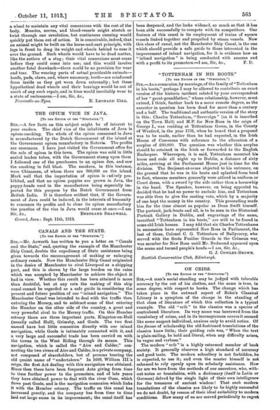CANALS AND THE STATE.
[TO THE EDITOR OF THE "Sesorwroit."; Sin,—Mr. Acworth has written to you a letter on " Canals and the State," and, quoting the example of the Manchester Ship Canal, doubts the expediency of State assistance being given towards the encouragement of making or enlarging ordinary canals. Now the Manchester Ship Canal originated in the desire of Manchester to rival Liverpool as a shipping port, and this is shown by the large burden on the rates which was accepted by Manchester to achieve the object it had in view. Whether this result has been attained is more than doubtful, but at any rate the making of this ship canal cannot be regarded as a safe guide in considering the present and future position of our " inland navigation." The Manchester Canal was intended to deal with the traffic then entering the Mersey, and to subtract some of that entering the Humber on the other side of the country, a great and very powerful rival to the Mersey traffic. On this Humber estuary there are three important ports, Kingston-on-Hull (usually called Hull), Grimsby, and Goole. The two first named have but little connexion directly with our inland navigation, while Goole is intimately connected with it, and a very large and successful trade has been carried on with the towns in the West Riding through its means. This navigation, which is called the " Aire and Calder," con- necting the two rivers of Aire and Calder, is a private company, not composed of shareholders, but of persons bearing the old quaint name of "undertakers." In 1699, William reign, the first Act dealing with this navigation was obtained. Since then there have been frequent Acts giving from time to time further power to the promoters, and of late years they have obtained power to deal with the river Ouse, which flows past Goole, and is the navigation connexion which links it with the Humber estuary. The traffic on this canal has increased greatly, and the company has from time to time laid out large sums in its improvement; the canal itself has been deepened, and the locks widened, so much so that it has been able successfully to compete with its competitors. One feature of this canal is its employment of trains of square vessels linked together and propelled by steam vessels. Now this class of canal, not the Manchester Ship Canal, is the one which should provide a safe guide to those interested in the improvement of inland navigation, for it is evidence how an " inland navigation " is being conducted with success and
with a profit to its promoters.—I am, Sir, &c., F. D.














































 Previous page
Previous page